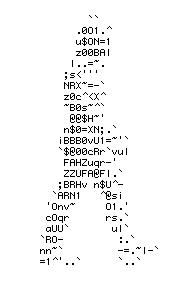Guardian: Aufruf an "Blogger"
Although the most influential commentators in Britain seem disinterested in starting weblogs at this time, the British online scene is getting richer with "would-be broadsheet columnists" who run political blogs, writes Matthew Tempest in the Guardian. He asserts that Britain is starting to follow America's lead, using weblogs to make a political statement. At this time, he observes that the conservative right has a bigger presence online in Britain than the liberal left. One of the reasons why the leftists are not better represented in blogs may be that they are "just too divided and disorganized to put up an online fight," he adds. Tempest briefly reviews several U.K. political blogs. Among them, Voxpolitics.com is about e-democracy. Shamedagain.blogspot.com is a "simple, comment-free resource of all those 'Britain has Europe's largest/poorest/longest/worst/least...' stories." And Alister Black's blog includes "theories on the conspiracy end of the spectrum that never get any mainstream media scrutiny."
The Guardian invites those who write, run or know of Political blogs they believe should be reviewed to contact the paper at politics.editor@guardian.unlimited.co.uk.
Zum Artikel
The Guardian invites those who write, run or know of Political blogs they believe should be reviewed to contact the paper at politics.editor@guardian.unlimited.co.uk.
Zum Artikel
Cyberwriter - 21. Feb, 13:24 - Blogging
3 Kommentare - Kommentar verfassen - 0 Trackbacks
Susi - 21. Feb, 13:40
wenn i den anwähl
kommt
DAS raus!!??
DAS raus!!??
Cyberwriter - 21. Feb, 13:44
Meinst du den Artikel?
Ich komm da drauf:
Sites of resistance
The weblog is proving to be a simple idea with enormous potential. Matthew Tempest reviews some of the most prominent British political blogs
Matthew Tempest, political correspondent
Tuesday February 18, 2003
With hardcore porn, online gambling and even Guardian Unlimited only a click away, why would anyone want the cyberspace equivalent of being trapped with the pub bore as he details his enlightened opinions on everything from Iraq to the congestion charge?
Well, perhaps counterintuitively, the weblog, and more specifically the political weblog, is one of the few forms of "buzz journalism", allowing any voter, activist and armchair pundit to bore for Britain.
Not that many press or broadcast journalists appear to be aware of them yet, but what do they know?
A blog, as the digital generation will already know, is essentially nothing more complicated than an online diary of thoughts, comments, links, ramblings, rants and the like. As a form of digital self-publishing, this simple idea has blossomed in the past two years into a mega-community of annotators, compilers, conspiracy theorists and aggregators.
Quite how such a simple concept (most blogs are daily, short and succinct, and with plentiful links to relevant sources) has taken off was clearly demonstrated in the States when a cyber-campaign against Senator Trent Lott's advocacy of a segregationist US gathered up enough steam to be taken up by the mainstream media, with the result that he was effectively sacked due to internet lobbying.
Over in Britain, the cyber-scene is thus far a little duller and more prosaic, although there are signs that the elementary technology is beginning to beguile enough would-be broadsheet columnists. Of course, in essence, the blog is nothing more than electronic vanity publishing, but at the moment the focus is heavily on the DIY brigade. Britain's most influential rightwing commentators - Richard Littlejohn, Melanie Phillips, and the more eccentric Peter Hitchens - don't have blogs (although the latter two have sites which collate their published newspaper columns), but then neither do any of Britain's leading left or liberal columnists.
Indeed, as has been noted elsewhere, currently the web looks more like America's rightwing shock jock radio stations, with the pungent, pithy or perverse utterings of the pro-Bush/Blair/Israel axis perhaps better suited to bite-sized chunks of commentary than the more nuanced or reflective liberal left. Or perhaps, as ever, the left are just too divided and disorganised to put up an online fight!
What'll be interesting is when a politician starts keeping one ... indeed, it's a shame that the otherwise technophile Tony Benn doesn't blog his infamous diary online each night, rather than wait to publish the edited highlights every 10 years.
www.stephenpollard.net
Some people are never happy - and Stephen Pollard is one of them. Not content with a Reaganite hard right in the White House, Republican control of the Congress and Senate, rightwing leaders in France, Spain and Italy and a neo-liberal centre-right government at home, Mr Pollard - a former Express leader writer and now Brussels policy wonk - largely takes potshots at the perceived leftwing or pro-euro bias of the BBC, and the unreconstructed (as he sees it) hard-left cell at the Guardian.
So it may (or may not) come as a surprise that Mr Pollard is actually a card-carrying member of New Labour.
Partisan yet urbane, diverse but sparky, but pompous and prone to pointless melodrama ("In all my 38 years, I have never before felt such shame", he writes of the February 15th anti-war march), Pollard's is an addictive read of its type.
www.voxpolitics.com
Wanna sound like you know more than you really do about the cutting-edge confluence of politics and cyberspace? Five minutes of James Crabtree's daily updates on the currently nerdy but ultimately fascinating world of e-democracy will see you name-dropping dotcom buzzwords like "smart mobs" and "boiler plate activism".
If that sounds too "trendy-specs" for you, then there are real nuggets of hard, digestible and enlightening information, such as the throwaway remark that the congestion charge website will represent "the UK's biggest experiment in transactional e-government to date".
An elegantly design and jokey demeanour help make this an ideal starting point for politicos, researchers and hacks alike.
shamedagain.blogspot.com/
A fantastic e-idea, let down by the perennial blogging problems of poor updating and archiving. But what a smart concept - a simple, comment-free resource of all those "Britain has Europe's largest/poorest/longest/worst/least ..." stories that are the staple of the Sunday broadsheet market. And as our low-tax, low-spend, private wealth, public squalor country continues to grind to a halt, this could (with more work) become a very useful one-stop shop for argument-clinching facts and figures.
conservativecommentary.blogspot.com/
Slightly unusual in being a small "c" conservative, rather than hard-right Libertarian, Peter Cutherbertson's blog is perhaps the most domestic, even parochial, of the British blogs, and betrays a certain old fogeyishness rather than cutting-edge intellectual theorising. Thus, although there is much close reading of New Labour policy, some simply old-fashioned thinking ("For girls in particular, cigarettes can be a real aid to elegance, as proved by Marilyn Monroe and the like.") make the site less palatable to non-conservatives than needs be.
Could also do with archiving and cutting down the length of its front page.
hurryupharry.blogspot.com/
Harry Steele (a pseudonym for this Lancastrian activist) runs this site, which has benefited from a recent overhaul, and is now a sober and somehow fitting shade of grey. For Mr Steele, while ostensibly of the left, seems to be another David Aaronovitch/Rod Liddle/Johann Hari rightwing libertarian. Fairly straight, if a little lacking in character.
alister.blogspot.com/
With nice clean design and photo galleries a little reminiscent of indymedia , Alister Black's site has plenty of good points, including theories on the conspiracy end of the spectrum that never get any mainstream media scrutiny. However, it could do with a little more life and humour.
jannerboyuk.blogspot.com/
Sadly, the self-styled "Lefty B'Stard" shoots himself in the foot, with no updates since last December. It seems not even a global uprising by millions for peace can rouse this particular rabble-rouser ...
· If you write, run or know of a British political blog worth reviewing, please contact Guardian Unlimited Politics at politics.editor@guardian.unlimited.co.uk
What do you think?
Email us at politics.editor@guardianunlimited.co.uk
Sites of resistance
The weblog is proving to be a simple idea with enormous potential. Matthew Tempest reviews some of the most prominent British political blogs
Matthew Tempest, political correspondent
Tuesday February 18, 2003
With hardcore porn, online gambling and even Guardian Unlimited only a click away, why would anyone want the cyberspace equivalent of being trapped with the pub bore as he details his enlightened opinions on everything from Iraq to the congestion charge?
Well, perhaps counterintuitively, the weblog, and more specifically the political weblog, is one of the few forms of "buzz journalism", allowing any voter, activist and armchair pundit to bore for Britain.
Not that many press or broadcast journalists appear to be aware of them yet, but what do they know?
A blog, as the digital generation will already know, is essentially nothing more complicated than an online diary of thoughts, comments, links, ramblings, rants and the like. As a form of digital self-publishing, this simple idea has blossomed in the past two years into a mega-community of annotators, compilers, conspiracy theorists and aggregators.
Quite how such a simple concept (most blogs are daily, short and succinct, and with plentiful links to relevant sources) has taken off was clearly demonstrated in the States when a cyber-campaign against Senator Trent Lott's advocacy of a segregationist US gathered up enough steam to be taken up by the mainstream media, with the result that he was effectively sacked due to internet lobbying.
Over in Britain, the cyber-scene is thus far a little duller and more prosaic, although there are signs that the elementary technology is beginning to beguile enough would-be broadsheet columnists. Of course, in essence, the blog is nothing more than electronic vanity publishing, but at the moment the focus is heavily on the DIY brigade. Britain's most influential rightwing commentators - Richard Littlejohn, Melanie Phillips, and the more eccentric Peter Hitchens - don't have blogs (although the latter two have sites which collate their published newspaper columns), but then neither do any of Britain's leading left or liberal columnists.
Indeed, as has been noted elsewhere, currently the web looks more like America's rightwing shock jock radio stations, with the pungent, pithy or perverse utterings of the pro-Bush/Blair/Israel axis perhaps better suited to bite-sized chunks of commentary than the more nuanced or reflective liberal left. Or perhaps, as ever, the left are just too divided and disorganised to put up an online fight!
What'll be interesting is when a politician starts keeping one ... indeed, it's a shame that the otherwise technophile Tony Benn doesn't blog his infamous diary online each night, rather than wait to publish the edited highlights every 10 years.
www.stephenpollard.net
Some people are never happy - and Stephen Pollard is one of them. Not content with a Reaganite hard right in the White House, Republican control of the Congress and Senate, rightwing leaders in France, Spain and Italy and a neo-liberal centre-right government at home, Mr Pollard - a former Express leader writer and now Brussels policy wonk - largely takes potshots at the perceived leftwing or pro-euro bias of the BBC, and the unreconstructed (as he sees it) hard-left cell at the Guardian.
So it may (or may not) come as a surprise that Mr Pollard is actually a card-carrying member of New Labour.
Partisan yet urbane, diverse but sparky, but pompous and prone to pointless melodrama ("In all my 38 years, I have never before felt such shame", he writes of the February 15th anti-war march), Pollard's is an addictive read of its type.
www.voxpolitics.com
Wanna sound like you know more than you really do about the cutting-edge confluence of politics and cyberspace? Five minutes of James Crabtree's daily updates on the currently nerdy but ultimately fascinating world of e-democracy will see you name-dropping dotcom buzzwords like "smart mobs" and "boiler plate activism".
If that sounds too "trendy-specs" for you, then there are real nuggets of hard, digestible and enlightening information, such as the throwaway remark that the congestion charge website will represent "the UK's biggest experiment in transactional e-government to date".
An elegantly design and jokey demeanour help make this an ideal starting point for politicos, researchers and hacks alike.
shamedagain.blogspot.com/
A fantastic e-idea, let down by the perennial blogging problems of poor updating and archiving. But what a smart concept - a simple, comment-free resource of all those "Britain has Europe's largest/poorest/longest/worst/least ..." stories that are the staple of the Sunday broadsheet market. And as our low-tax, low-spend, private wealth, public squalor country continues to grind to a halt, this could (with more work) become a very useful one-stop shop for argument-clinching facts and figures.
conservativecommentary.blogspot.com/
Slightly unusual in being a small "c" conservative, rather than hard-right Libertarian, Peter Cutherbertson's blog is perhaps the most domestic, even parochial, of the British blogs, and betrays a certain old fogeyishness rather than cutting-edge intellectual theorising. Thus, although there is much close reading of New Labour policy, some simply old-fashioned thinking ("For girls in particular, cigarettes can be a real aid to elegance, as proved by Marilyn Monroe and the like.") make the site less palatable to non-conservatives than needs be.
Could also do with archiving and cutting down the length of its front page.
hurryupharry.blogspot.com/
Harry Steele (a pseudonym for this Lancastrian activist) runs this site, which has benefited from a recent overhaul, and is now a sober and somehow fitting shade of grey. For Mr Steele, while ostensibly of the left, seems to be another David Aaronovitch/Rod Liddle/Johann Hari rightwing libertarian. Fairly straight, if a little lacking in character.
alister.blogspot.com/
With nice clean design and photo galleries a little reminiscent of indymedia , Alister Black's site has plenty of good points, including theories on the conspiracy end of the spectrum that never get any mainstream media scrutiny. However, it could do with a little more life and humour.
jannerboyuk.blogspot.com/
Sadly, the self-styled "Lefty B'Stard" shoots himself in the foot, with no updates since last December. It seems not even a global uprising by millions for peace can rouse this particular rabble-rouser ...
· If you write, run or know of a British political blog worth reviewing, please contact Guardian Unlimited Politics at politics.editor@guardian.unlimited.co.uk
What do you think?
Email us at politics.editor@guardianunlimited.co.uk
Cyberwriter - 21. Feb, 13:52
ach so, jetzt weiss ich was Du meinst..
den shamedagain.blogspot.com/ -Link. Keine Ahnung was da los ist. :-( Die anderen scheinen zu funktionieren. Vielleicht hat Google eine Cache-Version?





















Trackback URL:
https://cyberwriter.twoday.net/STORIES/7148/modTrackback